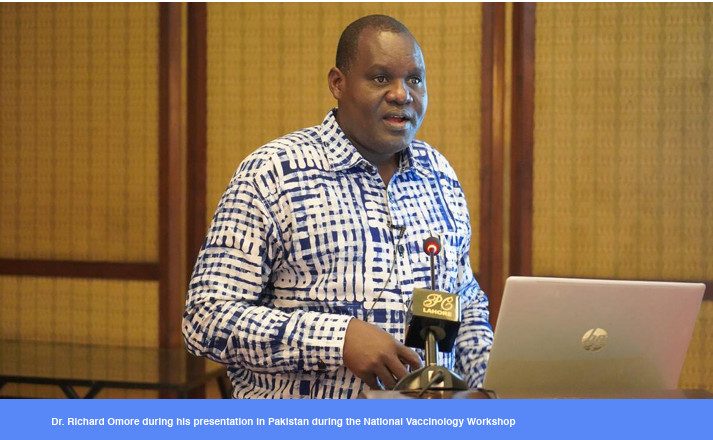
Scientific Excellence Takes Center Stage as 15th KASH Concludes
February 20, 2025
Unveiling Kenya’s Precision Medicine: Strengthening disease management through targeted therapy
February 20, 2025KEMRI Explores the Impact of Genetic Ancestry on Human Evolution and Migration Patterns in Africa

KEMRI’s 15th Annual Scientific and Health Conference (KASH) featured a symposium on Genetic Ancestry on 11th February, 2025, where researchers presented groundbreaking studies on ancestral genomics. The discussions highlighted the crucial role of genomics in tracing population histories and advancing precision medicine. The experts, stakeholders, and participants explored the transformative impact of genomic data on the understanding of human origins, migration, and diversity amidst the rapid advancements in genomic science.
The session covered key topics ranging from Genetic Ancestry and health, Considerations in Genome- Wide association study (GWAS) Analysis, Exploiting Human Genetic Ancestry in Healthcare, Genetic Ancestry in forensics and Current tools and technologies. Through interactive discussions and expert insights, attendees gained a deeper appreciation of the interconnectedness of human populations and the transformative power of genomic science.
During the session, the KEMRI Head of the Human Identification Laboratory, Dr. Eva Aluvaala on her presentation on Genetic Ancestry through Mitochondrial DNA and The Role of mtDNA in Ancestry and Forensics, explored the unique characteristics of mitochondrial DNA (mtDNA) and its utility in tracing human ancestry through haplogroups, particularly in African populations. The session highlighted the forensic applications of mtDNA in human identification, with a call for the inclusion of Kenyan mitogenome data in global forensic databases. Challenges such as high costs and infrastructure limitations were also discussed. Dr. Aluvaala emphasized the pivotal role of Genetic Ancestry in forensics. She Stated “Genetic ancestry plays a crucial role in forensics by providing the tools to connect individuals to their heritage and solve cases that would otherwise remain unresolved. By leveraging genomic data, we can not only trace familial lineages but also uncover valuable evidence that advances justice and human identification. This powerful tool is transforming the field of forensics and helping us unlock answers to long-standing mysteries.”


Experts in the field discussed cutting-edge research on genetic markers, their role in tracing ancestral lines, and how this information is being used to unravel the complex history of populations, particularly across Africa. The presentation addressed the underrepresentation of African populations in GWAS and the challenges posed by population stratification, which can lead to false disease associations. Techniques like Principal Component Analysis (PCA) and ancestry-informative markers were proposed to correct for these biases. The impact of evolutionary selection on genetic diversity, such as the sickle cell variant, was also discussed in the context of disease susceptibility.
Participants also gained insights into African genomic data in global databases to enhance precision medicine, given the high burden of non-communicable diseases in Africa. It outlined the importance of multi-ethnic analyses in improving disease predictions and treatment outcomes for African populations. ClinVar was proposed as a key platform for both accessing and contributing African genomic data. “Africa holds the deepest genetic diversity on the planet, yet its representation in global genomic databases remains minimal. If we truly want precision medicine to work for everyone, we must ensure African genomic data is included in the equation,” stated Dr. Bernard Kulohoma.
In addition, Mitochondrial DNA case study in forensics lab methodology session was presented which detailed the laboratory workflow for whole mitochondrial genome sequencing and bioinformatics analysis using CLC genomics workbench and AQME plugin. The results demonstrated high-quality, full-genome coverage, supporting accurate forensic and ancestry-related analyses.


The session also outlined the Current tools and technologies in forensic genetics whereby presentation reviewed forensic DNA processing advancements, including STR profiling with 8-dye PCR kits, capillary electrophoresis improvements, and emerging technologies like Massively Parallel Sequencing (MPS) and Forensic Investigative Genetic Genealogy (FIGG). Ethical concerns, infrastructure demands, and funding challenges were noted as barriers to implementing these technologies in Kenya. Challenges such as infrastructure gaps, database limitations, and ethical concerns need to be addressed to maximize the potential of genetic ancestry research in forensic and biomedical applications.
The workshop concluded with an engaging Q&A segment, where participants discussed genetic ancestry research, its accuracy, ethical concerns, and implications for precision medicine. The dialogue highlighted the responsible use of genomic data in addressing health disparities and advancing personalized healthcare, providing valuable insights into the future of ancestry studies.\



